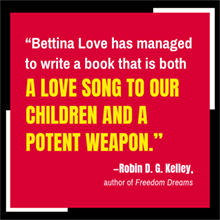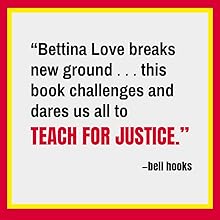معلومات عنا
حقوق الطبع والنشر © 2024 Desertcart Holdings Limited


Full description not available




L**Y
Preaching to the choir in ways that put off general readers
I wanted to love Belinda Love's book. I wanted to read something akin to Michelle Alexander's "The New Jim Crow," a book that lays out evidence for systemic oppression and racism in ways that people can begin to understand the problem.I wanted something more like bell hooks's Teaching to Transgress, a book that would unpack critical pedagogy and critical race theory and offer teachers actionable recommendations. I wanted a book like Chris Emdin's "For White Folks who Teach in the Hood."This is not that book.Love uses her position as a professor at UGA as grounds for expertise to speak to race and the effects of discrimination on the American school system. But she offers almost no evidence to back up her statements (odd choice for an academic scholar); no follow-up readings; very few statistics. If you already agree with her points (and I do), you might find the personal stories valuable. But this book will never convince anyone to adopt her viewpoint if they aren't already in agreement.For a book by an academic claiming to address education inequality in America, this flaw renders the book nearly useless to anyone who's trying to expand the horizons of white folks.I don't mind the wandering, discursive path that the author uses to make her point, weaving in personal story and quotes from other authors amidst her "main points." I even agree with her main points. But at best, this book is simply "preaching to the choir."Unlike the white-hot rage of Ta-Nehisi Coats's "Between the World and Me" which wrecked me and really opened my heart to the need for white people to ally with Blacks in a fight against incipient and open racism, Dr. Love's anger burns with little of Coats's eloquence and none of the value of his subsequent essays exploring pathways toward healing, correction, and reparations.I did appreciate her emphasis on joy as part of resistance. This theme emerged late in the book. I stuck it out only because I was reading for a book club. I wished she'd developed this as the entire point of the book.There is a place in print for rage and for personal memoirs and opinions. I'm not saying Love doesn't have a right to say her mind -- she does -- and if the book were billed more as personal reflections of a Black educator rather than a treatise on how to teach toward educational freedom and abolition, I wouldn't have minded. As it stands, this is one of the worst book purchases I've made in the past few years, and I will be donating it immediately.
M**R
A transformative call to action
This book is a must-read for every educator. It is completely transformative; and most importantly it's a call to action. Not in the gimmicky way that so many initiatives get pushed forward in districts, but in a real, down to earth way that begs and pleads educators to be human. Take a good hard look at yourself, your practices, your beliefs, your understandings, your own implicit bias. Look at your students as the beautiful, strong humans they are and the beautiful, strong, empowered humans they could be when given the tools to reach their potential. It's not about any kind of fix, or initiative, or data survey or test score. It's about humans helping humans.The only way to do that is to ask those same questions of your students. Not in a hypothetical sense where you make up the answers based on the visible, but really talk to your students. Dive deep into who they are and who they want to become. Then consider the power you have to raise them up!
A**O
Must read!
Dr. Love ha written a piece that EVERY EDUCATOR MUST read! Dr. Love shifts the paradigm of educational pedagogy by arguing that education is not enpugh nor the answer to creating transformational change. We need to create a world where black and brown youth are truly seen, celebrated, and provided with the utmost love and respect to thrive. This piece is amazing and a must read! As a high school educational leader and a higher ed professor, I will be using this text to engage existing and pre-professional educators in necessary reflection and the re-envisioning of education for liberation.
S**S
A beautiful call to action...
This should be required reading for anyone remotely involved with the education of children. Dr. Love inspires the heart while challenging the way one thinks. She defines black joy in a way that makes you smile and concurrently ache...and she unapologetically challenges systems that actively work to break that joy. She affirms those doing the work and calls out those who simply aren’t doing enough. Simply put, the book changes you. If I could give it a million stars, I would.
U**3
Worth reading or hearing
There were certain chapters that were pretty depressing, although all factual. It sometimes felt like a messy collage of topics, but each section was important to read. Some sounded more like a beating over the head of how alive racism is in our country, but as I progressed in reading, there were better chapters. I opted for the audiobook, so perhaps it was her voice that I was not attracted to. I preferred reading the book White Rage, which she refers to in her book. It seemed like this would be complementary to White Rage, as it briefly covers the topic. I recommend it, it’s just that some parts lag while others are more engrossing. Also, unlike White Rage, she does a good job in ending her book. White Rage has a weak ending that offers no real hope or solution after reading such dismal material.
ترست بايلوت
منذ شهر
منذ شهر